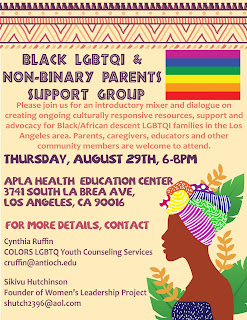By Sikivu Hutchinson
In Los Angeles school-communities, resources, support, and advocacy for families, parents, and caregivers of LGBTQI and Non-Binary K-12 youth are scant to nonexistent. Further, when the LAUSD deigns to address LGBTQI youth issues in its school-communities, African descent youth and families are seldom prioritized or represented in these discussions. Many queer Black youth report that there are no visible role models, curricula or cultural engagement that speaks to their lived experiences and GSAs (Gender and Sexuality Network Alliances) are MIA on predominantly Black campuses.
- More than three-fourths of Black and African American LGBTQ youth who responded to the survey have heard family members say negative things about LGBTQ people, and nearly half have been taunted or mocked by family for being LGBTQ
- More than three-fourths of Black and African American LGBTQ youth who responded to the survey have heard family members say negative things about LGBTQ people, and nearly half have been taunted or mocked by family for being LGBTQ.
- Eighty percent “usually” feel depressed, down, worried, nervous or panicked. Nearly half feel critical of their LGBTQ identities.
On August 29th, a meeting of Black LGBTQI family, caregivers, and community will be held in the Crenshaw District at the offices of APLA Health for an introductory dialogue and strategy session on providing culturally responsive resources, support and advocacy for queer youth. The meeting is organized through a partnership with APLA Health, Colors LGBT Youth Counseling Services and the Women's Leadership Project.

